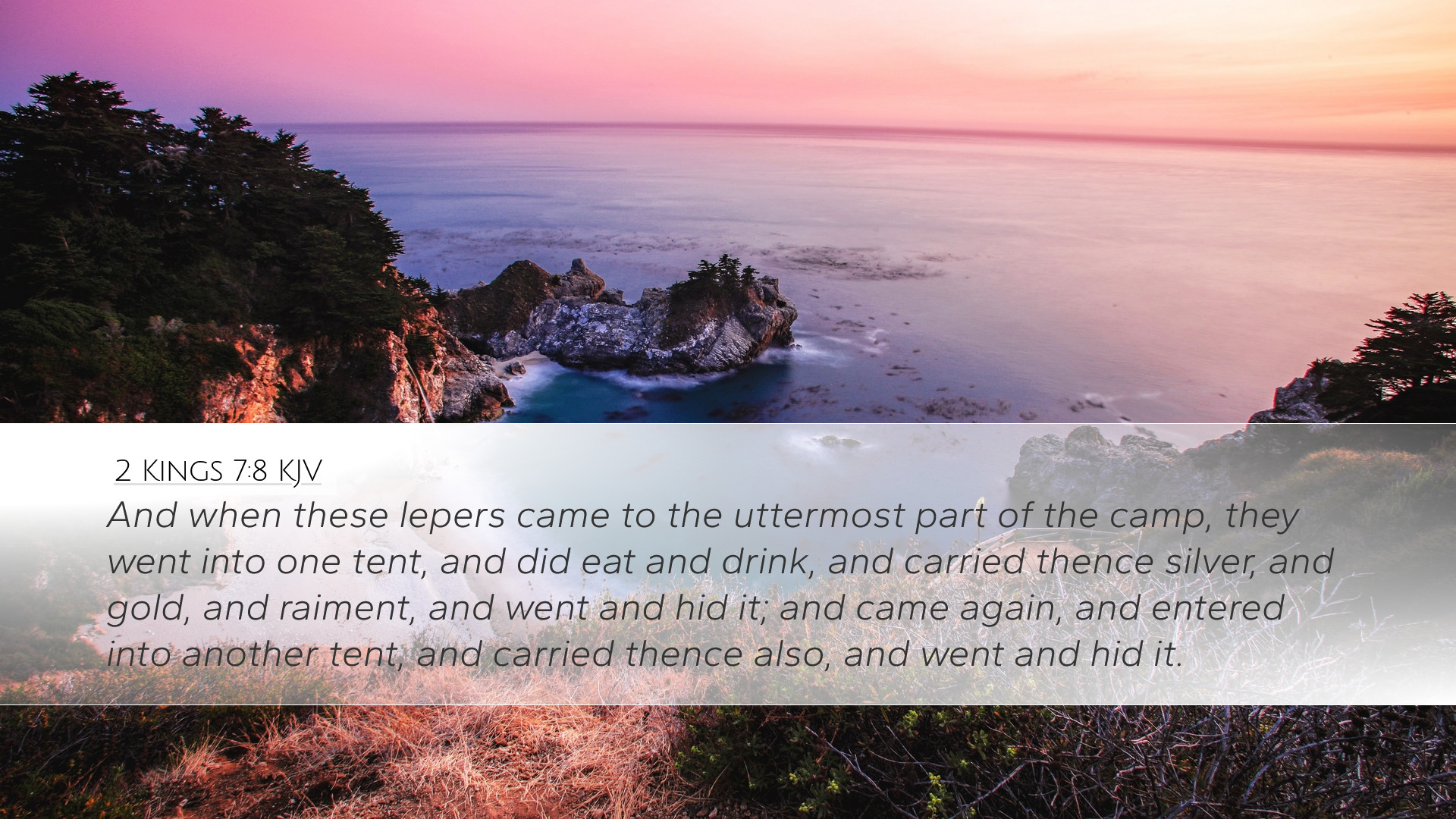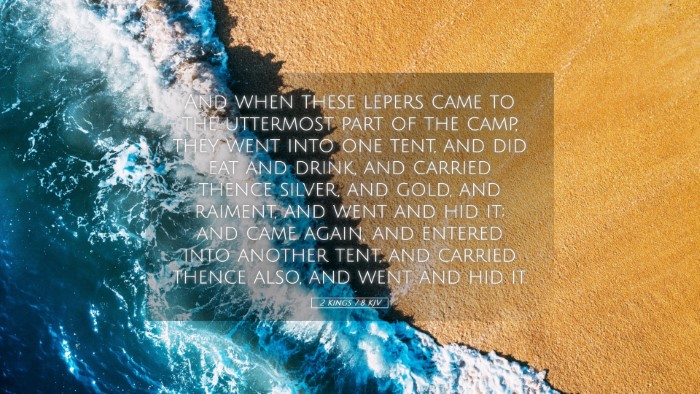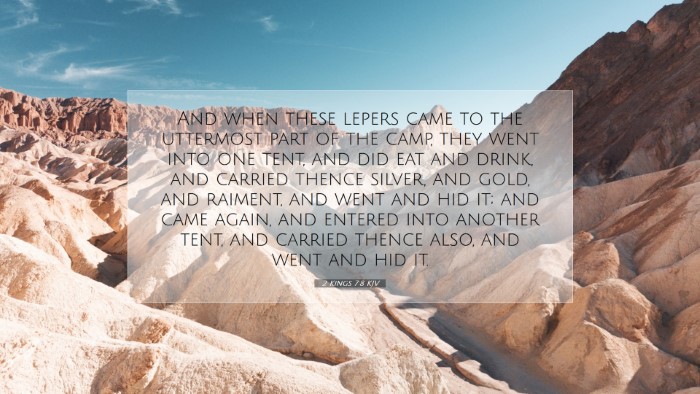Old Testament
Genesis Exodus Leviticus Numbers Deuteronomy Joshua Judges Ruth 1 Samuel 2 Samuel 1 Kings 2 Kings 1 Chronicles 2 Chronicles Ezra Nehemiah Esther Job Psalms Proverbs Ecclesiastes Song of Solomon Isaiah Jeremiah Lamentations Ezekiel Daniel Hosea Joel Amos Obadiah Jonah Micah Nahum Habakkuk Zephaniah Haggai Zechariah Malachi2 Kings 7:8
2 Kings 7:8 KJV
And when these lepers came to the uttermost part of the camp, they went into one tent, and did eat and drink, and carried thence silver, and gold, and raiment, and went and hid it; and came again, and entered into another tent, and carried thence also, and went and hid it.
2 Kings 7:8 Bible Commentary
Commentary on 2 Kings 7:8
Introduction: The passage of 2 Kings 7:8 presents a remarkable narrative that invites theological reflection and application. In this verse, we witness the actions of lepers who discover the abundance left by the fledgling Aramean army. Their response sheds light on themes of providence, mercy, and shared blessings. This commentary synthesizes insights from prominent public domain sources including Matthew Henry, Albert Barnes, and Adam Clarke, to provide a comprehensive understanding of the text.
Text of 2 Kings 7:8
"And when these lepers came to the uttermost part of the camp, they went into one tent, and did eat and drink, and carried thence silver and gold, and raiment, and went and hid it; and came again, and entered into another tent, and carried thence also, and went and hid it."
Contextual Background
The narrative unfolds against the backdrop of a city besieged by the Arameans, leading to dire conditions for the inhabitants of Samaria. The plight of the Israelites serves as a fierce reminder of both physical and spiritual starvation. Within this context, the lepers, socially marginalized due to their condition, find themselves in a unique position to witness God’s providence in an extraordinary way.
Analysis of the Lepers' Actions
- Social Status and Divine Favor:
Henry comments on the lepers’ societal rejection and how their condition places them at the brink of despair. Yet, their marginalized status becomes a vessel for experiencing divine favor—illustrating how God often uses the lowly and despised for His purposes. The lepers' discovery of plenty stands as a testament to God's ability to turn the tides of fortune, especially for those on the margins.
- Immediate Response:
Barnes points out the lepers' immediate action upon finding the supplies. Their instinct to eat and drink represents a natural response to their previous starvation. This moment reinforces the theme of God’s provision, not merely in physical sustenance, but as a manifestation of hope amidst despair.
- Redistribution of Blessings:
Clarke emphasizes the lepers' decision to hide the wealth they discovered. This act symbolizes the temptation to hoard blessings during times of abundance, yet it primes the lepers to realize that they have a responsibility to share their findings with others enduring hunger and hardship. The moral transformation they undergo is significant, setting the stage for their ultimate decision to return to the city.
Theological Insights
- Divine Providence:
Their discovery emphasizes God’s providence manifesting in unexpected ways. Just as the lepers were placed outside of society, so too was the city under siege in dire circumstances. The juxtaposition highlights that God's grace often finds us in our most desperate situations, lifting us into His abundance.
- Moral Responsibility:
The return of the lepers to inform the city embodies a profound ethical thrust. As noted by Henry, they recognize that their newfound fortune is not merely for personal gain but ought to be a catalyst for communal restoration. This embodies the biblical principle that blessings are to be shared, echoing the New Testament's teachings on generosity and care for the needy (Galatians 6:2).
- Reversal of Fortunes:
Clarke's interpretation of the lepers' journey reveals a rich tapestry of grace where the marginalized experience a reversal of fortune, reflecting the overarching biblical narrative where God elevates the humble and restores the lost. This not only informs the understanding of God’s character but also inspires hope for those in despair.
Identification with the Lamenting
Pastors, students, and theologians are encouraged to find parallels between the lepers and the contemporary church. As modern believers often encounter societal rejection, emotional pain, or spiritual famine, the principles demonstrated by the lepers can foster a posture of faith and action. The lepers’ journey from despair to abundance illustrates a biblical pattern of transformation and the call to share blessings with those who still suffer.
Applications for Today
- Acting in Faith:
Believers today are called to respond in faith, even when circumstances appear bleak. The lepers’ decision to act—regardless of their societal status—serves as a model for Christians to embrace opportunities to serve and share God’s blessings.
- Community Transformation:
The lepers’ return signifies the importance of community engagement. In a world torn by division and despair, believers must work to bring hope and restoration, fulfilling the Great Commission through acts of love and service.
- Celebration of God’s Goodness:
As the lepers rejoice in their newfound abundance, Christians are reminded to celebrate God's provision while being mindful of the suffering of others. The joy of the Gospel should compel believers to be instruments of change, invitational in sharing the faith that sets people free.
Conclusion
In conclusion, 2 Kings 7:8 encapsulates a powerful narrative of divine provision and moral responsibility. Drawing on the insights of Henry, Barnes, and Clarke enriches our understanding and challenges contemporary believers to embrace the call to act boldly on their faith. The lepers’ actions remind us that God's blessings are abundant and meant to be shared, inspiring hope and transformation amidst despair.


